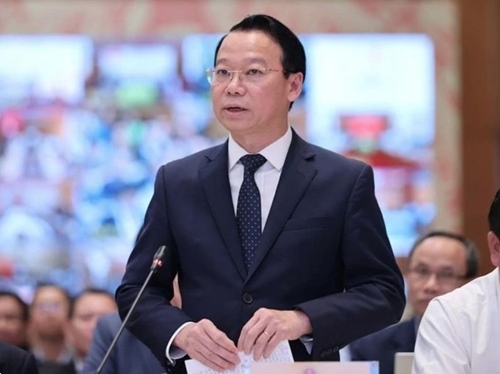The visit aims to strengthen bilateral trade relations and explore opportunities to expand imports of U.S. agro-forestry-fishery products, in a move to balance bilateral trade. Alongside their procurement efforts, Vietnamese businesses are also looking to acquire sci-tech solutions to enhance the agricultural value chain.
    |
 |
|
Minister of Agriculture and Environment Do Duc Duy (Photo: baochinhphu.vn) |
Minister Duy noted that while both Vietnam and the U.S. have strengths in agriculture, their products complement rather than compete directly with each other.
He stressed that with active engagement from both governments, the countries’ farming sectors are becoming increasingly interconnected, sharing supply chains, enhancing competitiveness, and ultimately benefiting producers and consumers alike. Vietnamese businesses are strongly supporting the Government’s efforts by increasing imports of key American agricultural products, helping to balance bilateral trade, strengthening the integration of the two countries' agricultural supply chains, and ensuring global food security, he said.
As many as 18 memorandums of understanding have been signed since early 2020 for Vietnamese enterprises to purchase U.S. agricultural, forestry, and seafood products, with a total value of 6 billion USD, of which 3 billion USD has already been disbursed.
Both countries are also working actively to open up markets for mutual fruit exports. Vietnam is among the first eight Asian countries to accept U.S. biotech crop varieties. In addition, the Government’s Decree No.73/2025/ND-CP, effective from March 31, has reduced tariffs on key U.S. agro-forestry-fishery exports to zero, with bilateral trade in these sectors growing around 10% annually over the past decade.
On the U.S.’s recent announcement of a 10% tariff on Vietnamese exports effective April 2, and the possible imposition of reciprocal tariffs of up to 46% starting July 9, Nguyen Do Anh Tuan, Director General of the International Cooperation Department under the Ministry of Agriculture and Environment, said these measures are likely to erode profit margins and reduce competitiveness for both Vietnamese and American businesses.
The tariffs risk disrupting the agricultural and forestry supply chains that both sides have worked so hard to establish. Moreover, as these products are essential commodities, any price increases would negatively impact U.S. low-income consumers in particular, he said.
Source: VNA